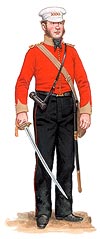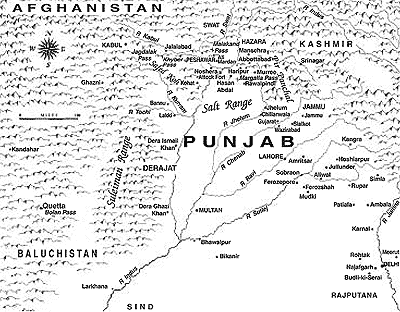The 31st Regiment & the Relief of Kabul
 |
| Officer, 31st (Huntingdonshire) Regiment. c1842 (Sikh Wars) (Click to enlarge) |
1841 was a year of impending crisis. Locally Shah Shuja was once again proving to be a weak and ineffective ruler who could not control the Afghan chieftains. In far off London the government was becoming increasingly concerned at the cost of the occupation and ordered maximum economies. One of the two brigades at Kabul was withdrawn to Jelalabad halfway back to the Khyber Pass and Peshawar, and most of the subsidies which were being paid to the chiefs to guarantee safe access to Kabul were discontinued, which resulted in widespread disruption of communications. Discontent throughout the country escalated into revolt. British garrisons under strong and active commanders at Kandahar and Jelalabad held firm but at Kabul Major-General Elphinstone was aged, ill and indecisive. A treaty was negotiated whereby the British at Kabul were promised safe passage back to India in return for leaving hostages behind to guarantee the return of Dost Mohammed. On 6th January 1842 British soldiers, civilians and camp followers set out for Jelalabad and India. There was already a foot of snow on the ground; all was muddle, and the straggling procession was fired on when it was hardly clear of the cantonments. Only one survivor reached Jelalabad.
Seen from India the situation was unclear. It seemed, however, that Jelalabad would be under siege, and military measures were initiated to secure its relief. Among them the 31st Regiment was ordered to move from Agra to Meerut, and from there to Peshawar. The regiment set out on 15th January in high spirits at the prospect of action. On reaching Meerut it established a depot for families and the sick, and despatched a detachment to the fort at Saharanpore where Dost Mohammed was being held, but a few days later it was recalled and the regiment moved on for Peshawar to join the army which was being assembled there. An attempt by the Ferozepore Brigade to break through the Khyber Pass and reach Jelalabad had failed and the only good news appeared to be that Maharajah Shere Singh, who had succeeded his father, Ranjit Singh, when he died in 1839, continued to permit the direct approach across his country.
(Click to enlarge)
Related

